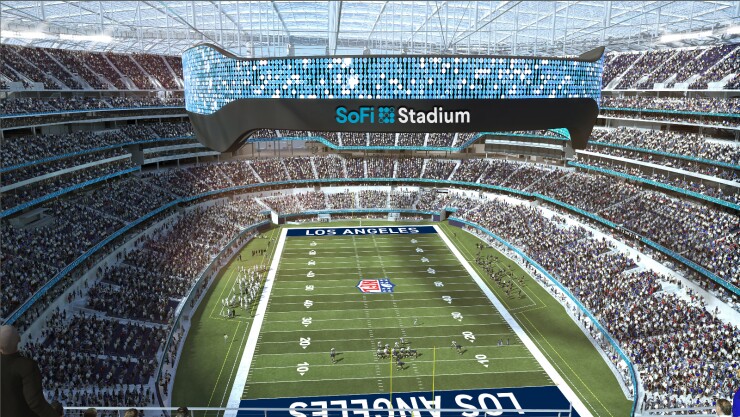How much is it worth to emblazon your firm’s name on the glitziest palace in all of pro sports?
That’s one question raised by the announcement Sunday that Social Finance Inc. has secured the naming rights for the new professional football stadium in Inglewood, Calif. Financial terms for the 20-year deal were not disclosed, but Bloomberg reported Sunday that the San Francisco-based online lender will pay more than $30 million a year, a record for the naming rights at a sports venue.
SoFi Stadium will be home to the Los Angeles Rams and Chargers, which means it will host twice as many regular-season games as most other NFL venues. It is being privately financed by Rams owner Stan Kroenke, and at 3.1 million square feet it will be the largest stadium in the NFL.
The stadium, which is scheduled to open next year, is slated to be the site of Super Bowl in 2022, the college football championship game in 2023 and the opening and closing ceremonies for the Summer Olympics in 2028.

It also happens to be in the flight path near Los Angeles International Airport, which means that passengers should see the SoFi logo when they peer out the windows of planes landing at
That’s a lot of eyeballs, but is it worth more than $600 million? And does the fact that SoFi still looks more like a startup than a ubiquitous public corporation factor into that equation?
It’s possible that the stadium’s naming rights are worth more to a company like SoFi, which was founded just eight years ago, than they would be to a firm that is more of a household name. SoFi reports that it has more than 800,000 members, which is a small fraction of the customer bases at big banks, and the 20-year naming rights deal will undoubtedly help that number grow.
“The partnership with this transformative project taking shape under Stan Kroenke’s leadership is the perfect opportunity to drive awareness and trust in the SoFi brand as we continue to grow and reach members on a national level," SoFi CEO Anthony Noto said in a press release.
But the stakes here are surely much higher for SoFi than they are when a more established company puts its name on a stadium.
Back in 2006, Citigroup agreed to pay a reported $20 million-plus a year for the naming rights at the New York Mets’ stadium in Queens. Last year, Citi recorded total revenue in excess of $72 billion, which suggests that the company spent less than $3 out of every $10,000 in revenue on the Citi Field deal.
The upshot is that even if Citi’s naming rights deal turned out to be a dud, it should not matter all that much to the company’s shareholders.
SoFi is in a very different position. The privately held company, which announced $500 million in equity financing from the Qatar Investment Authority in May,
In the first three months of 2019, SoFi posted higher revenue when compared with the prior quarter for the first time in a year,
The stadium will include a dedicated SoFi lounge for the online lender's customers, according to the press release. It will also have a 27,000-square-foot SoFi-branded space for special events.
But what should ultimately matter to SoFi’s shareholders is not whether the naming rights deal helps the company add customers and revenue, but whether it contributes to profitability.
Michael Leeds, a professor of economics at Temple University, is skeptical of the value of such deals. He and colleagues published research in 2007 that found no lasting impact on the profitability of companies that put their names on sports venues.
“The return was no better than the next best thing they could have done with their money,” Leeds said.
Those who doubt that the stadium deal represents the best possible use of SoFi’s cash can point to the fact that Noto, who became SoFi’s CEO last year, is a onetime NFL chief financial officer.
On the other hand, the online lender’s association with the NFL dates back to a Super Bowl commercial in January 2016, which was before Noto’s tenure.
And for a company looking to build its brand, there is arguably no bigger stage than the NFL. The league reported Wednesday that its opening-week games drew a total audience of more than 109 million viewers.
As Robert Wilmers, the late CEO of M&T Bank, wrote in 2004, after the Buffalo, N.Y.-based bank bought the naming rights for the Baltimore Ravens stadium, “Professional football, it’s worth noting, is ranked as the number one spectator sport in the U.S.”





